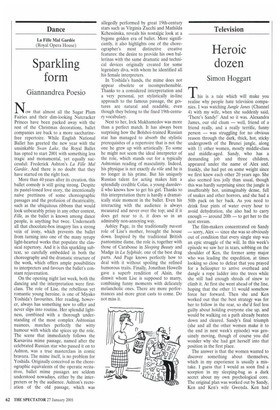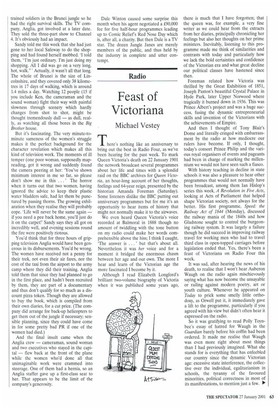Heroic dozen
Simon Hoggart
This is a tale which will make you realise why people hate television companies. I was watching Jungle Janes (Channel 4) with my wife, when she suddenly said, 'There's Sandy!' And so it was. Alexandra James, our old chum — well, friend of a friend really, and a really terrific, funny person — was struggling for no obvious reason through the dark, thick, hot, sticky undergrowth of the Brunei jungle, along with 11 other women, mostly middle-class and middle-aged. Sandy, who has a demanding job and three children, appeared under the name of Alex and, frankly, she had put on some weight since we first knew each other 20 years ago. She also seemed less jolly than usual, though this was hardly surprising since the jungle is insufferably hot, unimaginably dense, full of snakes and other horrors, and she had a 50lb pack on her back. As you need to drink four pints of water every hour to avoid dehydration, she also had to carry enough — around 201b — to get her to the next stream.
The film-makers concentrated on Sandy — sorry, Alex — since she was so obviously Out of condition that every single step was an epic struggle of the will. In this week's episode we saw her in tears, sobbing on the shoulder of Ken, the former army major who was leading the expedition, at times looking so close to defeat that you prayed for a helicopter to arrive overhead and dangle a rope ladder into the trees while she still had enough shreds of sinew to climb it. At first she went ahead of the line, hoping that the other 11 would somehow force her forward. Then she and Ken worked out that the best strategy was for her to follow in the rear, so she'd feel less guilty about holding everyone else up, and would be walking on a path already beaten down and cleared. Sandy's final triumph (she and all the other women make it to the end in next week's episode) was genuinely moving, though of course you did wonder why she had got herself into that position in the first place.
The answer is that the women wanted to discover something about themselves, which in my experience is usually a mistake. I guess that I would as soon find a scorpion in my sleeping-bag as a dark secret about my own psychological core. The original plan was worked out by Sandy, Ken and Ken's wife Gwenda. Ken had trained soldiers in the Brunei jungle so he had the right survival skills. The TV company, Anglia, got involved at a later date. They sold the three-part show to Channel 4. It's obviously had an impact.
Sandy told me this week that she had just gone to her local Safeway to do the shopping and had found herself mobbed. 'I told them, "I'm just ordinary. I'm just doing my shopping. All I did was go on a very long, hot, walk." ' Actually, it wasn't all that long. The whole of Brunei is the size of Lincolnshire, and they covered only 38 kilometres in 17 days of walking, which is around 1.4 miles a day. Watching 12 people (15 if you include Ken, the cameraman and the sound woman) fight their way with painful slowness through scenery which hardly changes from shot to shot, might be thought tremendously dull — as dull, really, as watching all those bores in the Big Brother house.
But it's fascinating. The very minute-tominute sameness of the women's struggle makes it the perfect background for the character revelation which makes all this kind of television work. The moments of ill temper (one poor woman, supposedly mapreading, got it wrong and suddenly found the camera peering at her: 'You've shown minimum interest in me so far, so please don't show me in this . ' The horror when it turns out that two women, having ignored the advice to keep their plastic water bladders safe, had let them be punctured by passing thorns. The growing exhilaration when they realise they will probably cope. 'Life will never be the same again — if you need a pee back home, you'll just do it on the carpet!' Sandy says they all got on incredibly well, and evening sessions round the fire were positively riotous.
You'd think that for three hours of gripping television Anglia would have been generous in its disbursements. You'd be wrong. The women have received not a penny for their trek, not even their air fares, nor the cost of the taxi from the airport to the army camp where they did their training. Anglia told them that since they had planned to go in the first place, and hadn't been recruited by them, they are part of a documentary and thus don't qualify for so much as a discount pizza token. Though they are allowed to buy the book, which is compiled from their own diaries, for a cut price. (The company did arrange for back-up helicopters to get them out of the jungle if necessary; sensible planning, since they could have come in for some pretty bad PR if one of the women had died.) And the final insult came when the Anglia crew — cameraman, sound woman and two executives who stayed in the capi tal — flew back at the front of the plane while the women who'd done all that unimaginable work were crammed into steerage. One of them had a hernia, so an Anglia staffer gave up a first-class seat to her. That appears to be the limit of the company's generosity. Dale Winton caused some surprise this month when his agent negotiated a £90,000 fee for five half-hour programmes leading up to Comic Relief's Red Nose Day which is, after all, a charity. But then Dale is a TV star. The dozen Jungle Janes are merely members of the public, and thus held by the industry in complete and utter contempt.























































































 Previous page
Previous page